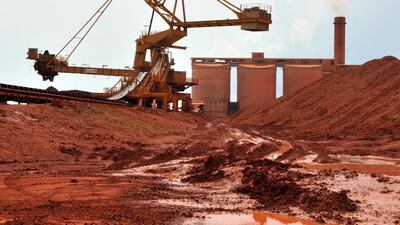Aluminium prices climbed to the highest level in more than a decade as political unrest in Guinea fuelled concerns over supply of the raw material needed to make the metal.
A unit of the military seized power and suspended the constitution, with head of special forces, Colonel Mamady Doumbouya, urging the army to back him.
That rattled global aluminium markets on Monday – prices in London notched a fresh 10-year high and futures in China climbed to the highest since 2006 – as the political instability raises the possibility of disruptions to bauxite shipments from the key global supplier.
Aluminium has climbed about 40 per cent this year in London as massive global stimulus measures stoked demand just as smelters in China, the biggest producer, struggled to maintain output during a seasonal power crunch and Beijing sought to rein in the country’s carbon emissions.
Bauxite is the feedstock used to make alumina, which is further processed into aluminium, and Guinea accounts for more than half of all of Chinese imports.
The market “can be seriously shaken” by the situation, United Company Rusal founder Oleg Deripaska said in a Telegram post. The company’s shares surged 14 per cent in Hong Kong to the highest since 2012.
Prices on the London Metal Exchange rose as much as 1.8 per cent to $2,775.50 a tonne, the highest since May 2011, and traded at $2,757. In China, futures jumped as much as 3.4 per cent to the highest since 2006, before paring gains to 2.2 per cent.
“Investors are quite concerned given China buys a big chunk of bauxite from Guinea”, though there haven’t been reports of disruptions yet and the extent of any impact will depend on how the situation evolves, Xiong Hui, chief aluminium analyst at Beijing Antaike Information Development, said.
Aluminium Corp of China, the biggest producer which has a bauxite project in Guinea, said all of its operations are normal and it has ample bauxite inventories at its plants in China. Shares in Hong Kong climbed as much as 10 per cent.
Investors are also looking at continuing production cuts in China’s Guangxi province, which is further tightening the market, Ms Hui said.
The energy-intensive aluminium industry has come under increased scrutiny as part of Beijing’s pollution crackdown. China produces around 60 per cent of the world’s total, with concerns around output prompting some of its largest smelters to pledge to ensure supply and metal to be released from state reserves to ease tightness. The country has become increasingly reliant on imports, a rare development that’s drained global supplies of the usually abundant metal.
Aluminium, used in everything from car parts to drinks cans and home appliances, fared particularly badly at the onset of the Covid-19 pandemic, but is now enjoying a strong resurgence as consumer demand and economic activity bounces back. In the longer term, the metal is set to benefit from its use in electric vehicles and renewable energy.

